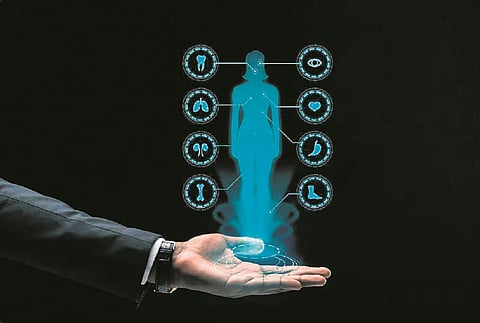

For most of us, ‘biohacking’ sounds like something that is out of a sci-fi thriller, involving machines, microchips, or a fridge full of expensive supplements. But in reality, it’s a lot closer to home. Think turmeric milk, skipping a meal occasionally, or meditating after a long day. As it turns out, you might already be a biohacker without even realising it.
According to Dr Sudeepta Rao D, MD (Internal Medicine), IFMCP, consultant physician, Yashoda Hospitals, biohacking in simple terms is: “Using targeted, often small, lifestyle and environmental changes to improve health, energy, and performance. Think of it as a practical, experimental way to optimise how your body functions — based on data, not guesswork,” The doctor further explains that she uses principles of functional medicine to guide these interventions. This includes understanding root causes, be it inflammation, hormonal imbalances, or gut dysfunction, and then applying targeted strategies like nutrition, sleep optimisation, or mindfulness. “It’s not a fad; it’s a structured, science-informed way to improve health outcomes. In many ways, biohacking is simply personalised preventive medicine,” Dr Sudeepta notes.
And it’s not about chasing six-pack abs or achieving superhuman strength either. “Most people don’t want ‘optimal performance’ — they want to stop feeling tired all the time, sleep through the night, or have better digestion. A functional approach might involve fixing nutrient deficiencies, improving sleep-wake cycles, reducing inflammation, or supporting the gut microbiome. The improvements may seem subtle at first, but they often create lasting change,” she adds.
Interestingly, many traditional Indian practices fall neatly into the biohacking bucket. “Making minor, scientifically supported adjustments to your nutrition, lifestyle, or body in order to enhance your physical or mental performance is known as ‘biohacking’,” says Dr Rajib Paul, senior consultant, Internal Medicine, at Apollo Hospitals, Jubilee Hills. He further adds, “Not all biohacking is safe for everyone. Biohacks that are generally safe (for most people), include common and low-risk practices like developing better sleeping habits, moderate and short-term intermittent fasting, making use of fitness trackers, cold showers, eating well and staying hydrated and frequent physical activity.”
Biohacking is different from traditional health practices like ayurveda or yoga, Dr Sudeepta expresses, saying, “Ayurveda and yoga are ancient systems rooted in understanding the body’s balance and resilience. Biohacking, in contrast, is data-driven — it often uses wearables, lab markers, and metrics to track change. That said, both systems share common goals: promoting longevity and a better quality of life. Functional medicine provides a bridge — we evaluate practices like ayurvedic herbs or yoga techniques through the lens of modern science. If something works and is safe, we look for ways to integrate it responsibly.”
But biohacking doesn’t look the same for everyone. “It always starts with the individual. We consider their diet, sleep, stress levels, work patterns, medical history and then layer in labs to fill in the gaps. In India, that might also mean factoring in vegetarian diets, vitamin B12 levels, pollution exposure, or even stress from caregiving roles. I work with my patients to create realistic plans — habits they can sustain, not just follow for a week,” she explains.
Modern technology, too, has carved a place in the practice. “Technology plays a major role in modern biohacking by helping you measure, track, and optimise your body’s performance in real time. Devices like fitness trackers, sleep monitors, and health apps act like personal data dashboards, giving you insights you can use to improve sleep, energy, fitness, stress levels, and even your mood,” Dr Rajib notes.
He adds that while many biohacking methods are safe when done correctly, some do carry risks or side effects, especially if taken too far, done incorrectly, or done without considering one’s individual health needs.
“In biohacking, diet and supplements are powerful tools to optimise how your body and brain function. The goal is to fuel your system for better energy, focus, sleep, immunity, and even mood all based on your personal needs,” Dr Rajib stresses.
At the end of the day, biohacking isn’t about becoming a better machine — it’s about becoming a better version of yourself. And sometimes, that just starts with listening.